11 Fixes: Mac/MacBook Keeps Restarting
Jan 13, 2026 • Filed to: Solve Mac Problems • Proven solutions
Are you experiencing the headache of your Mac/MacBook Pro constantly restarting? You're not alone. In this guide, we'll explore "why Mac keeps restarting" and provide 11 straightforward fixes to solve the "MacBook keeps restarting over and over" problem, helping you get back to hassle-free computing. Let's dive into these practical solutions and stop the endless cycle of reboots.
In This Article
Part 1. Why Mac/MacBook Pro Keeps Restarting?
You're wondering: "Why does my Mac / MacBook Pro keep restarting?" The answer is that when you install new software solutions on your MacBook Pro, it can lead to "kernel panic" (or KP) which leads to unexpected restarts. A kernel panic is not as scary as it sounds. When your computer's OS encounters an internal fatal error on bootup, and it can't safely recover or continue, it will display an error message informing you that it needs to reboot.
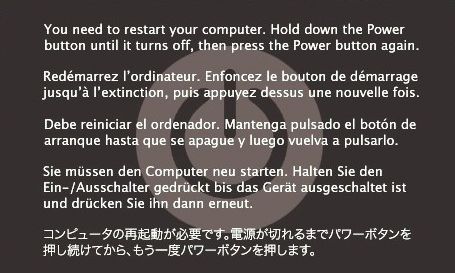
There can be many reasons why your MacBook keeps rebooting.
- The most common issue is conflicting applications.
- Another issue could be incompatible hardware or peripheral devices.
- It could be an issue of not enough RAM or hard drive space.
- The plugins or drivers could be out-of-date.
When your MacBook keeps restarting, this is what happens:
- The system detected a problem and it gives an error message that it must restart to fix the issue.
- If the system is truly stuck in the reboot cycle, the system will shut down.
- In general, a message will pop up on your Mac screen showing you "Your Computer restarted because of a problem."
Part 2. How to Fix "Mac/Macbook Keeps Restarting Over and Over"?
So, by now, you have an idea of why your MacBook keeps restarting, but how do you fix it? Here, We summarize the hardware-related issue and software-related issue and corresponding solutions. Take a systematic approach to troubleshooting, starting with the hardware. As you test the potential suspects, you can cross them off your list and move on to the next possibility.
- 1. Check the devices and hardware hooked up to MacBook
- 2. Using Apple Diagnostics
- 3. Check for Overheating
- 4. Check the software installed on your MacBook
- 5. Discover corrupt software
- 6. Fix disk permissions
- 7. Launch Disk Utility
- 8. Resetting NVRAM/PRAM
- 9. Disable Startup Items
- 10. Reinstall a clean MacBook Pro operating system
- 11. Recover loft Files
Issue 1: Hardware Conflict
The kernel panic can be caused by hardware conflicts. So, if you've recently installed new RAM, a hard drive, a printer, or other devices, the addition(s) may be contributing to the problem
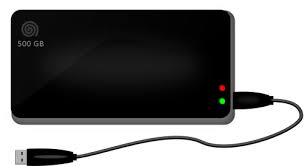
Solution 1: Check the devices and hardware hooked up to MacBook
1. Turn off your MacBook.
2. Disconnect all devices including printers (excluding the display, mouse, and keyboard).
3. Restart your MacBook.
4. Use your MacBook for the period that would typically have resulted in a restart.
- If your MacBook restarts, check the status of your internal RAM and any other hardware.
- If your MacBook does not restart, turn off your system and reconnect one device at a time per restart to troubleshoot your hardware issue.
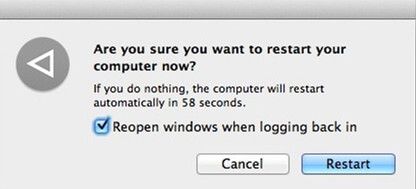
Solution 2: Using Apple Diagnostics
1. Disconnect All External Devices: Except keyboard, mouse, display, and Ethernet connection (if applicable).
2. Turn off your Mac, then turn it on and immediately press and hold the 'D' key until you see a progress bar or language selection screen.
3. Follow On-Screen Instructions: Check the diagnostics results for any issues.

Solution 3: Check for Overheating
This method can fix a MacBook that keeps restarting over and over by identifying if excessive heat is causing the device to shut down as a safety measure. Here are the steps:
1. Monitor Internal Temperature: Use applications like iStat Menus or Macs Fan Control to monitor the temperature.
2. Improve Ventilation: Ensure that your MacBook's vents are not blocked.
3. Clean Dust: Carefully clean any dust accumulation that might be causing overheating.
Issue 2: Software Conflict
Problems can pop up when you install new software on your MacBook. There could be a compatibility issue, or it could be that the lack of space on your hard drive is contributing to the problem, and making it appear that your issue is software-related.
Solution1: Check the software installed on your MacBook
1. Hold down the Shift button and boot into Safe mode.
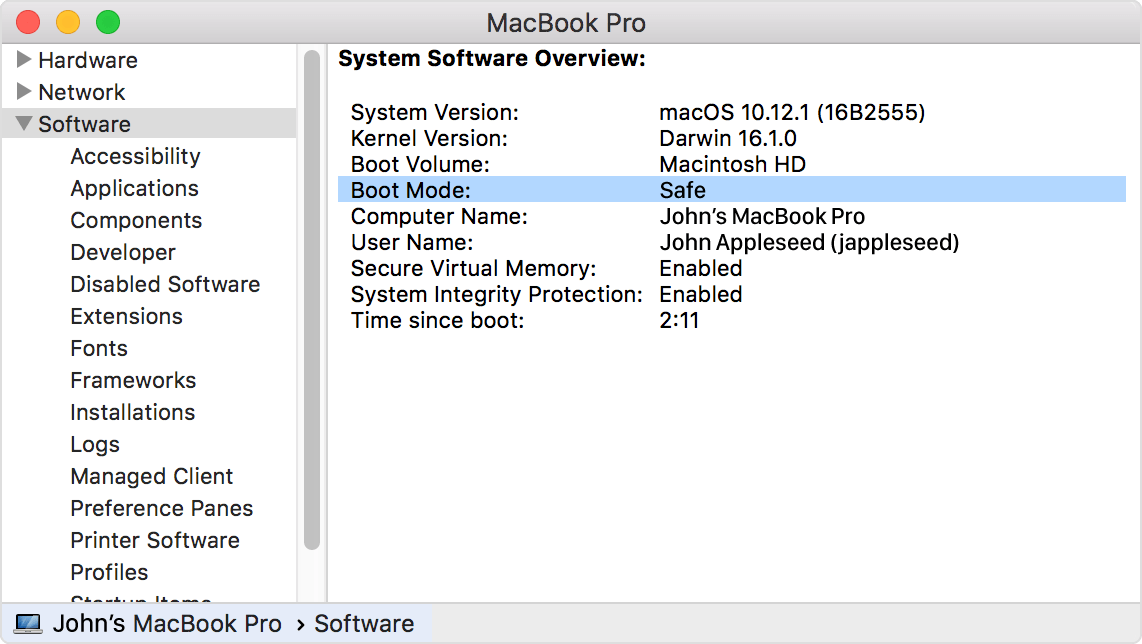
2. Back up your user files to an external hard drive.
3. Update the software on your MacBook.
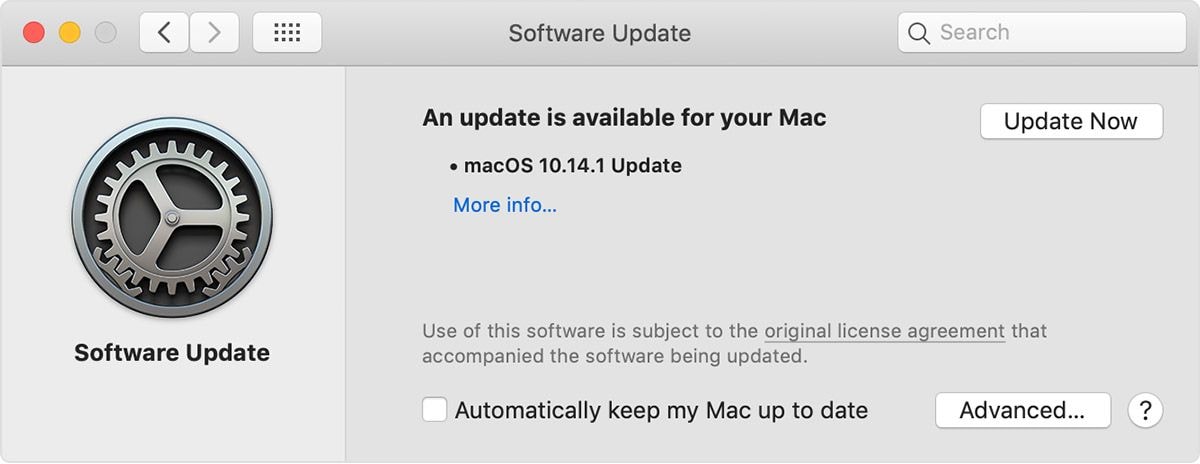
If the problem persists and is not resolved with the reinstallation of your software, it may be a recurring issue with corrupt software. It's not uncommon to be required to reinstall your software, so it's important to make sure you're regularly backing up your system.
Solution 2: Discover corrupt software
1. Update the corrupt software application.
2. Reboot your computer.
3. If you aren't able to reinstall or update the software application...
- Uninstall or delete the application.
- Use an app-installer tool to completely remove all traces of the corrupted app.
4. Reinstall the application.
If the "Kernel Panic" error is associated with random software applications, the problem probably has nothing to do with the applications themselves, but more to do with drivers or other conflicts.
Solution 3: Fix disk permissions
The problem of faulty disk permissions is yet another way that your software applications can go wrong and produce the "Kernel" error. The process of fixing permission errors is one of the most frequent troubleshooting tasks that are recommended beyond just when your iMac keeps restarting. (The diagnosis is often incorrect, but it is a safe thing to try.)
For OSX Yosemite or older:
1. Press Command + R to restart your MacBook Pro.
2. Open Disk Utility.
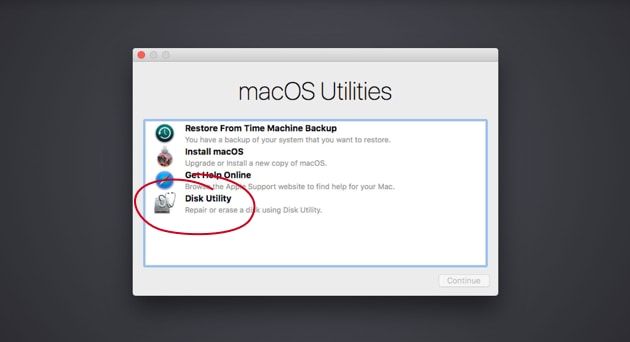
3. Select "First Aid," then "Repair Disk Permission."
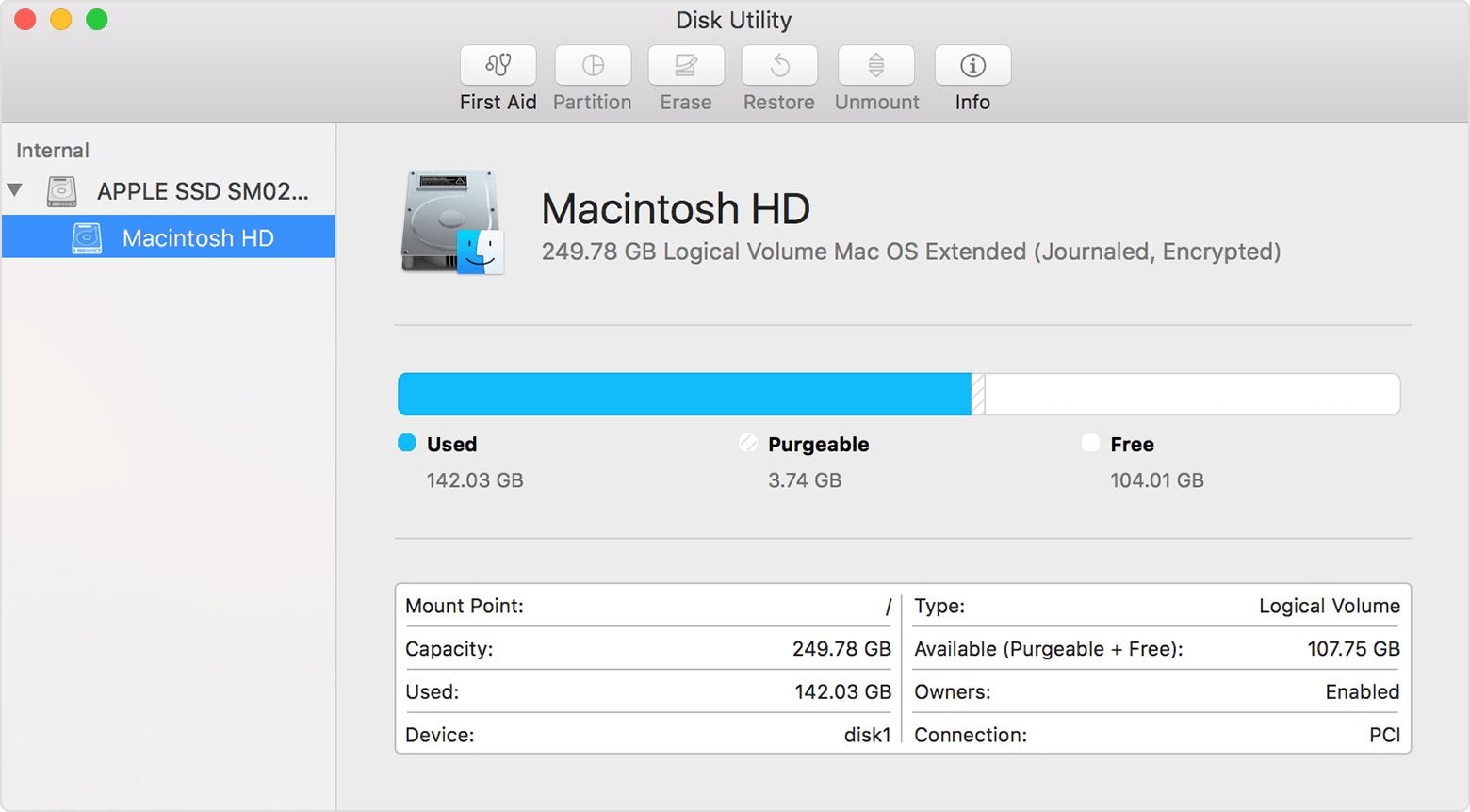
For macOS Sierra or OSX El Capitan:
1. Open CleanMyMac X.
2. Select the advanced Maintenance module.
3. Repair the disk permissions.
Fix the disk space issue:
- If you don't have enough free space via virtual or physical memory, your system will lag. You'll see poor performance. You may also see the Kernel Panic issue.
- To check to see if a lack of hard drive space is the issue, select the Apple menu.
- Select "About This Mac".
- Select the "Storage" tab.
- To resolve the disk space issue, install a larger hard drive.
- To resolve low-capacity hard drive space issues, without installing a new hard drive, delete files or programs to free up space.
- Run a CleanMyMac app to free up additional hard drive disk space.
Solution 4: Launch Disk Utility
You can fix corrupted files with your Disk Utility, which allows you to perform some tasks related to your storage and hard disks.
1. Select the Apple menu.
2. Select Restart
3. Hold down Command + R as your MacBook Pro is restarting.
4. Select Disk Utility.
5. Select First Aid.
Solution 5: Resetting NVRAM/PRAM
Resetting NVRAM/PRAM can fix a MacBook that keeps restarting by clearing out any corrupted settings or data stored in these memory areas, which may be causing the reboot issue. This process restores the default settings, potentially resolving the problem.
1. Shut Down Your Mac
2.Immediately press and hold the keys 'Option' + 'Command' + 'P' + 'R' for about 20 seconds.
3.Release the keys after 20 seconds or after hearing the startup chime for the second time.

Solution 6: Disable Startup Items
When you have too many startup items set to launch at startup, your MacBook Pro's processor can be overloaded and overloaded, which can lead to a Kernel Panic error and an auto restart. Disable startup items to see if that's the reason for your error issues.
1. Select the Apple menu.
2. Select System Preferences.
3. Select Users & Groups.
4. Select your username from the menu.
5. Select the Login Items tab
6. Select a startup item to disable and then select "–".
7. Restart your MacBook Pro.
Continue this process until all the startup items are disabled. You may be surprised by how many items are being loaded at startup. You can add back one startup at a time and reboot between each addition, so you can determine which item is causing a problem. You can use the CleanMyMac app for maintenance which may resolve your issues more quickly.
Solution 7: Reinstall a clean MacBook Pro operating system
When other fixes do not resolve the reboot issue, you need to reinstall a clean install of the operating system on your MacBook Pro.
1. Restart your MacBook Pro.
2. Hold down Command + R as your MacBook Pro is restarting.
3. Select "Reinstall macOS" or "Reinstall OS X" to initiate a clean install of the OS that came with your MacBook Pro.
Solution 8: Recover Lost Files
Recoverit Data Recovery is the best file recovery software for your MacBook Pro.

Recoverit Data Recovery - The Best File Recovery Software
- You can quickly and easily recover files you've lost by reinstalling the MacOS.
- Recoverit supports the recovery of photos, videos, documents, archives, and more than 1,000 other types of files.
- You can also scan your hard drive and preview the files you want to save before you initiate the recovery process.

Step 1. Launch Recoverit
Install Recoverit, and open the application. If you've already installed the application, select the "Recoverit" icon from the MacBook Pro desktop. It can take a few seconds to launch the program.
- Select the source location, where you've lost your files.
- Initiate the scan to search for the lost files.
Recoverit displays a list of all the files that you can recover. Review the files to determine which ones you need to recover. Select the "Recover" button.
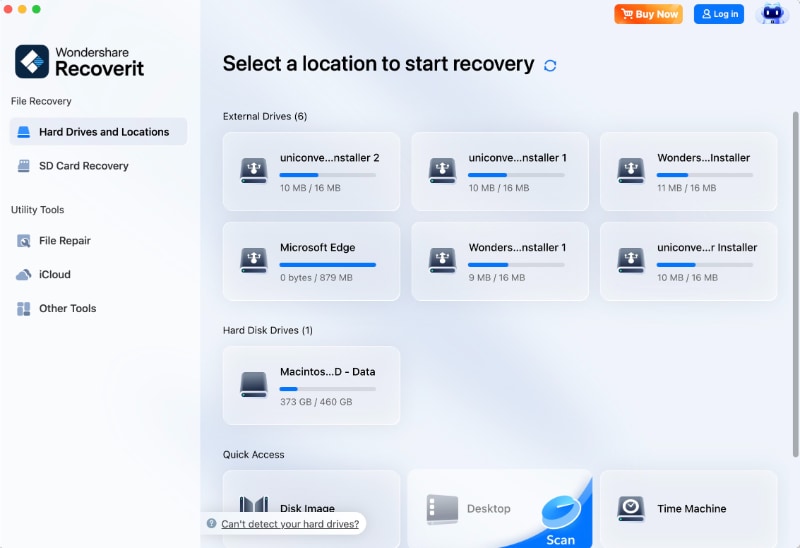

Step 2. Recover Files
To recover files, repeat the main three steps.
- Select the source location.
- Initiate the scan to search for the lost files.
- Preview and recover.
You should be able to get a listing fairly quickly. If you don't see the file(s) you need to recover, you can still try one more method of recovery.

Select "All-around Recovery" to run a more in-depth scan and see if you can recover your files. The results are usually better with the deeper scan.
Part 3. How to Prevent "Mac Keeps Rebooting" Issues
It's always preferred to resolve the reboot issue before you have the complaint: "My Mac keeps restarting."
Tip 1: Keep Your Mac OS Updated
A missing Mac update can cause unusual restart issues. Your Mac is confused and needs the latest update(s).
- Select the Apple menu.
- Select System Preferences.
- Select Software Update.
- Click Update Now to install the updates.
You can click "More Info" to see details.
When your Software Updates are complete, your MacBook Pro will prompt you if the update requires you to restart your computer. To make this process easier, and to be sure that you have all the correct updates, you can set up your computer to automatically install updates in the future.
Tip 2: Verify Software Compatibility
Many software issues can be resolved by just being cautious and prepared before you install new applications.
- Read install details to see if there are known issues.
- Check forums to see if there are any reported compatibility issues.
- Be sure to verify that there are no issues with other software you've already installed in the past.
Tip 3: Verify Hardware Compatibility
Just as you can resolve software issues by being proactive about your installs, you can do the same with hardware. Some hardware just does not play nicely together, but you should also check to see if it is compatible with Mac.
- Read through any hardware install details to find out if there are known issues with compatibility with your MacBook Pro.
- Check forums to see if there are any known compatibility issues with hardware related to MacBook Pro.
- Be sure to verify that there are no issues with other hardware that you've already installed in the past.
Part 4. Extra Info About Mac Startup
The bootup process for your MacBook Pro appears to be fairly simple. You just press the button, and the computer starts up. There's actually a lot more going on behind the scenes when you start your computer. Your MacBook Pro is running a series of initializations.
- Select the "On" button.
- The hardware and firmware is initialized (loaded & run)
- The firmware runs the power-on self-test (POST) It tests the processors, memory, peripherals, etc.
- The indication of startup both sounds and displays.
Of course, there can always be an issue with the startup initialization process. This article just discusses one symptom (the reboot) that can go wrong.
What About Next Time?
The next time you won't be saying, "My MacBook Pro keeps restarting over and over." You'll have the answers to solve the problem. By regularly backing up your MacBook Pro, and keeping your files and updates current, you're able to avoid many troubleshooting problems beyond just the restart fix for your computer. You don't have to be an IT expert to put into place very simple strategies and processes that will save you time, and money, and also make it easier for you to use your computer for the purposes it's intended for.
Free Download Free Download Free Download
Frequently Asked Questions about MacBook Keeps Restarting
-
Why does my MacBook keep restarting over and over?
Your Mac/MacBook Pro may keep restarting due to hardware or software issues, such as overheating, corrupted system files, faulty hardware components, or incompatible software.
-
How can I fix my Mac/MacBook Pro that keeps restarting?
To fix a Mac/MacBook Pro that keeps restarting, try the following: 1. Check for overheating, 2. Reset NVRAM/PRAM, 3. Run Apple Diagnostics, 4. Boot into Safe Mode, 5. Update macOS and apps, 6. Check for hardware issues, and 7. Reinstall macOS.
-
When should I contact Apple Support for a Mac/MacBook Pro that keeps restarting?
If you've tried troubleshooting steps and your Mac/MacBook Pro still keeps restarting, or if you suspect a hardware issue, it's best to contact Apple Support for further assistance or to schedule a repair.
What's Wrong with Mac
- Recover Your Mac
- 5 best data recovery software for Mac
- Recover my trashed files.
- Recover deleted files on Mac.
- 3 ways to restore Mac photos.
- Recover SD card files on Mac.
- Recover files from external hard drive on Mac
- Fix Your Mac
- Fix grey screen at startup.
- Ethernet issues occur | Fixed.
- Mac won't shut down. Boot it.
- Solve flashing question mark.
- Fix slow WiFi after upgrade.
- Delete Your Mac
- Format your USB drive.
- Delete APFS partition.
- How to format APFS drive.
- What can be cleaned on Mac.
- Format external hard drive.
- Learn Mac Hacks


 ChatGPT
ChatGPT
 Perplexity
Perplexity
 Google AI Mode
Google AI Mode
 Grok
Grok
























Sue Wayne
staff Editor